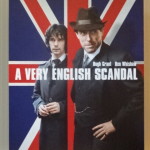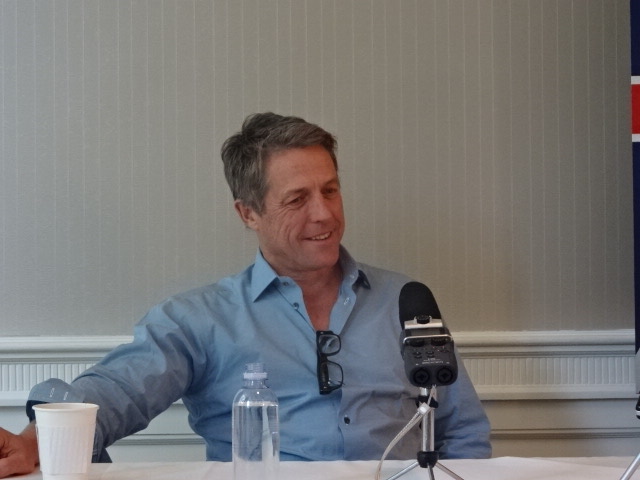Here’s a self-professed admission from Hugh Grant, whose films over the past several decades have grossed more than $3 billion globally at the box office.
Until just very, very recently, he was a snob about TV, even as his co-stars and colleagues long ago made the transition and continue to topline the small screen’s highest quality productions.
But that’s all in the past now with his starring role in “A Very English Scandal,” a true-life tale of clandestine gay sex, secrets, lies, attempted murder and betrayal that first aired on the BBC and is now streaming on Amazon Prime Video.
The London-based actor, no stranger to this town, was in Los Angeles last week to promote the show for Amazon and held a Q&A billed as a news conference for a small group of entertainment reporters held, fittingly, at the London Hotel.
Arriving about 15 minutes later than billed, the salt-and-pepper haired, blue-eyed Grant, who is not known to be enamored of the media, displayed a wry British charm and dry sense of humor that clearly worked its magic on the assemblage.
Not only did he say he was a reformed snob about TV, but he admitted his son had to tell him how to work one. “Now I’ve watched ‘The Crown’ and ‘Big Little Lies,” he admitted. “One of the reasons I was behind the times is that I just watched motor racing and tennis.”
But back to the program at hand, a three-part series that attracted much acclaim in Great Britain and whose producers are obviously now working the awards campaign trail on these shores.
“The book on which it’s based is so blackly comedic. Russell David it is a proper genius screenwriter, and I loved working with Stephen Frears, Ben Whishaw and Alex Jennings,” Grant said about the director and his co-stars. “I love the tone. It’s kind of dramatic but irreverent and slightly camp.”
He did intense research for the role of Jeremy Thorpe, who died in 2014, reviewing video of him and speaking with many people who knew him. As a Member of Parliament and leader of Britain’s Liberal Party, Thorpe’s long political career came crashing down when he was accused of conspiracy to murder a former lover, with whom he denied having a relationship.
Rumors of their affair had swirled for more than a decade before Thorpe faced trial in 1979.
Grant well recalls the scandal when it broke in the late 1970s.
He admitted he loved it—even calling it “fabulous,” and said the Thorpe affair spawned a lot of schoolboy jokes. Upon being pressed, he admitted one of them: “Join the Liberals, widen your circle.”
After the laughter died down, he became circumspect while discussing Thorpe’s character.
“The whole fun of him is he was in many ways appealing and narcissistic– and sociopathic enough to order a murder. And then there’s the tragedy of being gay man at that time and trying to express love in its natural form. His narcissism is so extreme that you can’t really engage with other people. He had a life of passion of building up his career and then to have one man about to bring him down is Shakespearean,” said Grant. “I definitely had sympathies for him. I think in some ways the verdict was more tragic than a guilty verdict. It was like the O.J. verdict, or the phone hacking trial. Thorpe was never employable after that. No one would have him.”
 Those with long memories will recall that Grant was the center of his own sex scandal in 1995 when he was arrested with a prostitute named Divine Brown in his car parked near Sunset Blvd.
Those with long memories will recall that Grant was the center of his own sex scandal in 1995 when he was arrested with a prostitute named Divine Brown in his car parked near Sunset Blvd.
His handling of the incident became a textbook case of successful celebrity crisis management when “The Tonight Show’s” Jay Leno famously asked him shortly thereafter, “What the hell were you thinking?” The actor admitted he did “a bad thing,” said he deserved a whipping and asked for forgiveness and was clearly granted it by the public–with nary a negative effect on his booming career.
Going back to those days, for most people Grant will always be known as the star of hugely successful romantic comedies, beginning with his breakout in 1994 with “Four Weddings and a Funeral,” which made him a global movie star. The hits kept coming in the 1990s and 2000s with films including “Notting Hill,” “Bridget Jones’s Diary” and “Love Actually.”
Much as the audience may long to see him to do more – including many of the journalists participating in the news conference who asked questions about them– Grant said he’s done with rom-coms.
“I don’t want to look a gift horse in the mouth, because they’re popular to this day,” Grant said about the romantic comedies. “I’m grateful, but pleased to be through with them. The stuff I’m doing now is fractionally more challenging and interesting.”
Yet he caused a ripple of excitement when he announced there would be a “Four Weddings” sequel-ette for the benefit of Comic Relief, similar to the one done in 2017 for “Love Actually” that reunited Grant with co-stars including Liam Neeson, Bill Nighy, Colin Firth, Keira Knightley, Andrew Lincoln, Chiwetel Ejiofor and Laura Linney.
Grant said he was thrilled about his recent serious roles, including 2016’s “Florence Foster Jenkins” (his first project with Frears) opposite Meryl Streep and playing an actor-y villain in last year’s “Paddington 2,” calling the family film “kind of a masterpiece.” He also mentioned “About a Boy” as one of his favorite previous roles.
Grant was asked about how society has radically shifted in its acceptance of homosexuality. “I’m 58, and it’s astonishing what’s happened in our lifetime. My parents—and most people–wouldn’t talk about it in the 1960s and 70s,” said Grant. “Russell David is involved in gay politics, and one of his big interests [in this project] was demonstrating how far we’ve come, and the whole decriminalization of homosexuality in Britain.”
Answering a question about whether it was more difficult to perform gay or straight love scenes, he broke up the room at the London with this answer: “Doing a gay love scene is not more awkward. It’s like ‘how was your breakfast?’ and I then I put my tongue down his throat, and threw him on the bed. No one yelled ‘cut,’ so I licked his nipples.”
Grant said the Profumo affair, which brought down a British politician in the 1960s because of his liaison with a young model who had ties to the Soviets, and the Thorpe scandal underscored a hard truth. “Learning deep down we’re all filthy, dark, devious and murderous is joyful,” he said and then asked rhetorically, “Were people really scandalized by Monica Lewinsky [and Bill Clinton]? Probably not as much as the media wanted them to be.”
Grant made headlines in 2011 when he helped expose a phone hacking scandal at the now-defunct, Rupert Murdoch-owned British tabloid News of the World and at other newspapers. Investigations revealed that reporters hacked into the phones of celebrities, politicians, members of the British royal family and the family of a young girl who was murdered. Police bribery and political cover-ups were also exposed as the revelations rocked the U.K.
Asked about the repercussions on journalism in Great Britain, Grant said the current state of affairs was back to what he called “square one.” “You don’t want state-run media, but you don’t want a media-run state, which is what we have there.”
Still, he didn’t seem to mind too much talking to U.S. press.
(“A Very English Scandal” streams on Amazon Prime Video.)


